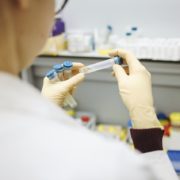As of Wednesday, December 16, members of the public will be able to get an antigen test for Covid-19 for free at one of the 2,000 testing sites around the country.
1) What is an antigen test?
An antigen test looks for the protein in the novel coronavirus, as opposed to PCR tests, which detect the virus’s genetic material. The PCR – or polymerase chain reaction – tests are extremely accurate but take time to produce results – usually within 24 to 48 hours.
2) Where can I get tested?
Testing is possible in multiple places. The easiest way is in collection centers, but it is necessary to book an appointment first, either by phone or online. The list of sampling points is available on the website of the Ministry of Health. Testing will also be performed by some general practitioners. This list is also published on the website of the Ministry of Health.
3) How does testing work?
The test is similar to the PCR tests: it is necessary to take a sample from the nasopharynx. However, the result can be produced in about 15 minutes.
4) How many times can I get tested?
Every citizen can be tested several times, but always with a time interval of at least five days. Antigen tests are free until January 15, 2021.
5) Who can be tested for free?
Testing is free for everyone who has health insurance in the Czech Republic. It is necessary to show an identity card and health insurance card.
6) I’m positive, what’s next?
Isolation and epidemiological investigation begin immediately. Everyone who has been in contact must then be quarantined. If the person receives a positive result but is asymptomatic, he needs to do a PCR test in a sampling center.
7) What does the antigen test show?
This COVID-19 test detects certain proteins in the virus. Using a nasal swab to get a fluid sample, antigen tests can produce results in minutes. Others may be sent to a lab for analysis. A positive antigen test result is considered accurate when instructions are carefully followed, but there’s an increased chance of false-negative results — meaning it’s possible to be infected with the virus but have a negative result. Depending on the situation, the doctor may recommend a PCR test to confirm a negative antigen test result.
8) What is the capacity of the tests?
According to the Minister of Health, the total capacity should be up to 60,000 people tested per day.
9) How can diagnostic and antibody testing help reduce the spread of COVID-19?
With COVID-19 diagnostic testing, people who test positive and have symptoms can get care earlier. Contacts can be traced and self-isolation or quarantine started sooner to help stop the spread of the virus.
But no COVID-19 test is 100% accurate. It’s possible to test negative yet actually be infected (false-negative result) or to test positive and not be infected (false-positive result). So it’s vital to continue to follow COVID-19 guidelines, such as social distancing and wearing a mask when appropriate.
Results of antibody tests indicate how many people had COVID-19 and recovered, including those who didn’t have symptoms. This aids in determining who might have immunity, though to what extent and for how long is not yet known.
10) If antigen tests are less accurate, why would we use them?
Experts say the value in the rapid antigen tests is in the frequency of the testing rather than the accuracy, with repeated testing recommended. According to Science, getting a false negative in an antigen test two or three times in a row is rare. This strategy lines up with the NPR report mentioned above, which would employ daily testing of those in high-risk areas.
Support Prague Morning!
We are proud to provide our readers from around the world with independent, and unbiased news for free.
Our dedicated team supports the local community, foreign residents and visitors of all nationalities through our website, social media and newsletter.
We appreciate that not everyone can afford to pay for our services but if you are able to, we ask you to support Prague Morning by making a contribution – no matter how small 🙂 .




